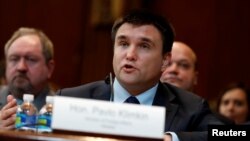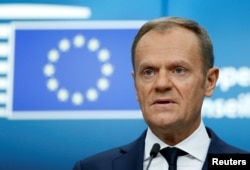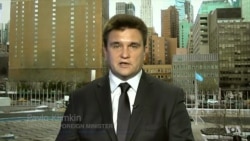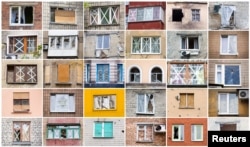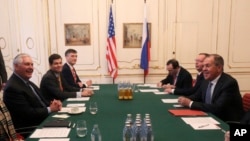Ukraine’s foreign minister applauded decisions announced this week by Canada and the European Union (EU) as important in demonstrating the international community’s solidarity with Ukraine and sending a clear message to Russia.
“Look, Russia does not live in a vacuum, sanctions are effective,” Pavlo Klimkin said Friday in an interview with VOA.
EU Council President Donald Tusk announced Thursday that leaders of the organization’s 28 member states were “united on the rollover of economic sanctions on Russia.”
The European Union’s sanctions post constraints for Russia’s access to the coveted EU markets. Initially, they were put in place in 2014 “in response to the illegal annexation of Crimea and deliberate destabilization of a neighboring sovereign country.” The EU said all sanctions are kept under “constant review” in order that they continue to contribute toward their stated objectives.
WATCH: Ukraine's Pavlo Klimkin on Russian sanctions
Earlier this week, the Canadian government added Ukraine to its Automatic Firearms Country Control List, thus enabling Canadian individuals and companies to apply for permits to export certain prohibited firearms, weapons and devices to Ukraine.
“Canada and Canadians will continue to stand with the people of Ukraine and support Ukraine’s territorial integrity and sovereignty,” Canadian Minister of Foreign Affairs Chrystia Freeland declared.
Klimkin said Western nations, “especially Europe, understands more and more that Russia has also been waging hybrid war against European institutions.”
International community
Against this background, “there definitely will be more pressure, in the sense of targeted sanctions, in the sense of solidarity” coming from the international community, he said.
Ukraine hopes this sense of solidarity will manifest in a United Nations mandate for an international peacekeeping mission in eastern Ukraine, responsible for, in Klimkin’s words, “what is going on and what will be going on in the occupied Donbas,” including a level of security, and free and fair elections.
“We will keep pushing Russia to accept that fundamentally, it’s about Russia out, international component in, there’s no other way around it,” Klimkin told VOA’s Ukrainian service.
In the meantime, he says Russia has been trying to “fix up the situation in Donbas. ... Russia has been trying to come up with more provocations, the idea is very clear: to maintain a Russian protectorate on the ground; the whole idea is simply to say: Look, it’s about internal conflicts in Ukraine.’”
The United States has been a strong critic of Russia’s actions in Ukraine.
‘The single most difficult obstacle’
Secretary of State Rex Tillerson voiced the administration’s frustration during his recent trip to Europe.
“President (Donald) Trump, as you know, throughout his campaign was very clear that he views it as very important that Russia and the United States have a better relationship, that it is important that countries as powerful as these two nations are should have a more positive relationship,” Tillerson said in Vienna.
“When one country invades another, that is a difference that is hard to look past or to reconcile,” he said, adding, “We’ve made this clear to Russia from the very beginning that we must address Ukraine. It stands as the single most difficult obstacle to us renormalizing the relationship with Russia, which we badly would like to do.”
Natalie Liu has been a staff reporter and writer at Voice of America since 2005. She currently covers the diplomatic beat.
Myroslava Gongadze is VOA’s Ukrainian service chief.




